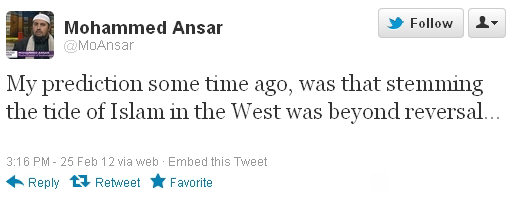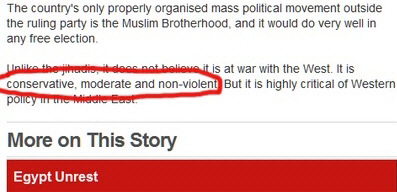The BBC told the Science and Technology Committee that…..’Climate change is “a matter of reporting and journalistic inquiry, and one where our strong reputation for independence is paramount”.’
However…….David Jordan, Director of Editorial Policy and Standards for the BBC, told them that “politicians driving an issue and talking about its importance and policy developments in relation to it will be clearly important to our news agenda”
So politicians are driving the news agenda…regardless of the science?
It does look like that….see the interview with Andrew Miller, Labour MP below.
The BBC always tell us, as indeed it does above, that its independence is paramount.
Just how does the BBC square that with the implication we get from the Science and Technology Committee’s report that the BBC is just the voice of government peddling their climate propaganda….‘politicians driving the news agenda’?
The Committee is clearly tryng to control how the BBC reports on climate change and demands that it makes itself available to push the green message….to adopt ‘collective responsibility’ for ‘persuading’ the Public to accept climate change is man made and sacrifices have to be made.
The Committee has evidence that the BBC et al can be a vital component in that battle for hearts and minds…and wallets…..
“The media have an enormous impact on behaviour and belief” and forms “the key source of information, especially the BBC, for what people believe on almost any issue you want to name”. With regards to climate change the most referred to single source of information (58%) was TV news, usually the BBC…..”TV news was the most cited source of information on climate science”.
Shame the BBC says…….
‘Although we do not have specific evidence of climate change itself, the BBC’s audiences expect it to deliver high-quality programming that is informative and educational about science in general and, therefore, about climate change in particular.’ David Jordan the BBC’s Director of Editorial Policy
The report states….
The BBC News teams continue to make mistakes in their coverage of climate science by giving opinions and scientific fact the same weight.
Yes……much of the global warming ‘science’ reported by the BBC is merely pure opinion, dogma or theory based on computer models, self delusion and wishful thinking.
Despite that the BBC has been bombarding us with alarmist climate change messages….in the run up to the IPCC’s latest report they warmed us up with a few alarmist disaster scenarios and then went full tilt when the actual report came out.
Climate Change 2014: Impacts, Adaptation, and Vulnerability
SUMMARY FOR POLICYMAKERS
Just how good was the BBC’s reporting? Well Andrew Miller, Labour MP and chair of the Science and Technology Committee, said there was a ‘Fantastic piece by Matt McGrath…world class piece of reporting.’…of course McGrath, the ‘new Black’, force fed us an unadulterated version of the IPCC’s uber alarmism.
Miller was interviewed on the Today programme (08:35)….some highlights of which are below……
Miller tells us that there needs to be a ‘collective responsibility’ to get the message of climate change across to the public…..that is a joint effort by politicians, scientists and the media.
People who are unwilling to accept climate change is real have attitudes which are unhelpful to getting that message out.
Climate change (man made), he tells us, is one of the biggest challenges facing the planet at the present time.
False balance….there is an overwhelming amount of science that supports the climate change case….and the BBC should not provide sceptics with so much airtime and should label them as having vested interests….but he doesn’t require the same disclosure for the so-called ‘experts’.
David Jordan, Director of Editorial Policy and Standards for the BBC, said ‘We seek to avoid equal time and status for scientists and non scientists.’
Evan Davis solely talked of sceptics as ‘non-experts’ or ‘non-scientists’.
Miller tries to label sceptics as having an agenda with vested interests…describing them as ‘not disinterested parties and lobbyists who should be labelled as such.‘
Evan Davis asks…How often is the BBC guilty of providing such a platform to sceptics?
Miller claims ‘It happens consistently in the climate change debate.’
Jordan then states that….’Such interviews [As with Nigel Lawson] are not typical of the BBC’s coverage of climate change…there is a huge amount of output by the BBC devoted to this subject based on an acceptance that climate change is happening.‘
The trouble is that isn’t what Jordan told the Committee, as they report:
David Jordan, Director of Editorial Policy and Standards for the BBC, was less emphatic on the status of the science, stating that:
The BBC believes that it has an important role to play in explaining climate science, climate change and global warming, if that is what is happening, to its audiences. All our evidence is that, although we do not have specific evidence of climate change itself, the BBC’s audiences expect it to deliver high-quality programming that is informative and educational about science in general and, therefore, about climate change in particular.[81]
Although, later in the evidence session, he seemed less sceptical:
There are now very few people who say that no global warming is happening and it is not the result of man-made activity, but the debate has moved on to the precise ranges and all sorts of other questions
So the BBC, despite having no specific evidence of climate change, has gone on to produce a ‘huge output….devoted to this subject based on an acceptance that climate change is happening.‘
And what of those ‘sceptics’….just how unqualified are they?
Paxman interviewed James Lovelock last night (23 mins)…he introduced him with these words…..
‘One of the world’s top public intellectuals, a titan of post-war science working outside mainstream scientific institutions coming up with some of the most original ideas of our time.‘
Note that ‘working outside mainstream scientific institutions’…..not of the ‘consensus’ then? And yet still a ‘Titan of post-war science’!
And what did Lovelock have to say?
James Lovelock: Take this climate matter everybody is thinking about. They all talk, they pass laws, they do things, as if they knew what was happening. I don’t think anybody really knows what’s happening. They just guess. And a whole group of them meet together and encourage each other’s guesses.
And what about vested interests?
Jeremy Paxman: It follows from [what you‘ve said] , does it not, that this panel on climate change which has, as you point out, vested interests involved, may be just as likely or even more likely to make mistakes?
What about Dr Tol so disparaged by Miller? The Economist thinks he might have a point….
Richard Tol of Sussex University, in Britain, disparagingly appraised the report’s conclusions as “the four horsemen of the apocalypse”. The final version appears to have been fought over paragraph and comma between those (such as Dr Tol) who want to describe dispassionately what they think is happening and those who want to scare the world into taking action.
And what of the latest report? The Economist notes that it breaks with the previous dogma….
A new way of looking at the climate for both scientists and policymakers. Until now, many of them have thought of the climate as a problem like no other: its severity determined by meteorological factors, such as the interaction between clouds, winds and oceans; not much influenced by “lesser” problems, like rural development; and best dealt with by trying to stop it (by reducing greenhouse-gas emissions). The new report breaks with this approach. It sees the climate as one problem among many, the severity of which is often determined by its interaction with those other problems. And the right policies frequently try to lessen the burden—to adapt to change, rather than attempting to stop it. In that respect, then, this report marks the end of climate exceptionalism and the beginning of realism.
In other words it lines up with what George Bush used to promote (and be derided for by the likes of Justin Webb) and Lawson does now….adaption and acceptance of change.
But Lawson is apparently unacceptable as a commentator on climate change.
Miller and the Green lobby relentlessly try to paint the GWPF and the likes of Nigel Lawson as some kind of extremist anti-science group funded by secretive industrial barons seeking to undermine the saviours of the Planet….but what does the GWPF really think?
The GWPF does not have an official or shared view about the science of global warming – although we are of course aware that this issue is not yet settled. On climate science, our members and supporters cover a broad range of different views, from the IPCC position through agnosticism to outright scepticism. Our main focus is to analyse global warming policies and their economic and other implications. Our aim is to provide the most robust and reliable economic analysis and advice.
And what about anyone else who cares, or dares, to raise a question or two about the ‘science’?
Are they qualified or able to understand the science?
Dr Emily Shuckburgh who published the report titled Climate Science, the Public and the News Media in 2012,[39] believed that there was an appetite for more information and that:
“many non expert members of the public do have a wide ranging and subtle understanding of climate change, are able to grasp new concepts, and are willing to engage in debate”
‘Willing to engage in debate’….but the likes of Miller only want to debate with those who already believe…in other words no debate at all.
Is it that sceptics are ignorant or stupid?
Study: Climate Change Skeptics Know More About Science Than Believers
Despite allegations that they are tantamount to “flat earthers,” a study published Sunday in the Nature Climate Change journal indicates that climate change skeptics actually tend to have a slightly higher level of general scientific knowledge than those who believe in the theory.
From the Nature journal (the Climate change alarmist’s bible):
Seeming public apathy over climate change is often attributed to a deficit in comprehension. The public knows too little science, it is claimed, to understand the evidence or avoid being misled. We conducted a study to test this account and found no support for it.
Members of the public with the highest degrees of science literacy and technical reasoning capacity were not the most concerned about climate change.
But of course people like Miller see no contradiction in the fact that he himself feels able to speak ‘expertly’ about climate or that a BBC journalist like McGrath can be ‘fantastic and world class’….purely because he produces what Miller approves of in the way of climate propaganda.
So how qualified is Miller or any politician?
Dr Sarah Wollaston, Conservative MP for Totnes. Interviewed before she was elected, said: ‘I just don’t think that there are enough people in Westminster who can read a scientific paper.’
Miller is not a scientist, and definitley not a climate change scientist:
He went on to study at the London School of Economics where he was awarded a diploma in industrial relations in 1977. He worked initially as a laboratory technician at the Department of Geology at Portsmouth Polytechnic……In 2010 Miller was confirmed as the first Chair of the House of Commons Science and Technology Select Committee
And what about McGarth….we know Harrabin is moonlighting from his real expertise as an English graduate…..what are McGrath’s scientific qualifications?…..
Originally from Tipperary in Ireland, Matt edited computer magazines for several years before joining BBC Radio 5 live at its launch in 1994. Following stints as producer and reporter, Matt became the station’s science specialist in 1997.
And the IPCC Chairman Rajendra Pachauri? A railway engineer.
Lord Stern?.…an economist.
The bumptious Bob Ward? A geology graduate who works now as a green PR guru for a multi-millionaire businessman who said:
“Our first responsibility is to make money for our clients….and nothing is more important than oil.” Jeremy Grantham….Bob Ward’s boss and also that of Lord Stern.
I could go on and on…..but if we are to label all those who are interviewed on the BBC I’d be quite happy with that…I somehow doubt the green lobbyists would be quite so happy as they realise their charade and fraudulent posturing is exposed.
But should ‘non-scientists’ be denied a voice….especially when discussing policies designed to combat global warming or actions to adapt to such a scenario?
The Guardian tells us:
We took a strategic decision about five years ago that, looking at the swathe of opinion in the scientific literature and the voices of people like the Royal Society and so on, this was a major scientific issue, with potentially profound societal and economic consequences.
You can see what is at stake…with many a grasping hand being shoved forward for a piece of the pie:
There is far greater emphasis to adapting to the impacts of climate in this new summary. The problem, as ever, is who foots the bill?
“It is not up to IPCC to define that,” said Dr Jose Marengo, a Brazilian government official who attended the talks.
“It provides the scientific basis to say this is the bill, somebody has to pay, and with the scientific grounds it is relatively easier now to go to the climate negotiations in the UNFCCC (United Nations Framework Convention on Climate Change) and start making deals about who will pay for adaptation.”
So the IPCC’s ‘science’ is providng the basis for many countries to try and claim massive payouts from those they would like to blame for climate change….and we know who the BBC labels as to blame…..the West….
Climate change poses a huge barrier to a fulfilling future, argues Lord Puttnam, an ambassador for Unicef UK. In this week’s Green Room, he asks what price children will have to pay for three or four carbon-happy generations?
This is politician and ‘climate expert’ Chris Huhne in the Guardian….
The scientific case is strengthening: developed countries are to blame for global warming – and there will soon be a legal reckoning
Would you enjoy the cosiness and warmth of Christmas with your children or grandchildren just that little bit less if you knew that other people’s children were dying because of it? More than four million children under five years old are now at risk of acute malnutrition in the Sahel, an area of the world that is one of the clearest victims of the rich world’s addiction to fossil fuels.
That sort of attitude is why genuine debate about what is causing climate change is so important with far reaching consequences.
Climate is political….the science is irrelevant for many….it is now used to promote a political agenda that aims to undermine the West and reduce it to poverty and decline…..
Mike Hulme, until recently head of the Tyndall Centre at the UEA, gave the game away in his book “Why We DisAgree About Climate Change”:
The idea of climate change should be seen as an intellectual resource around which our collective and personal identities and projects can form and take shape. We need to ask not what we can do for climate change, but to ask what climate change can do for us.
……
Because the idea of climate change is so plastic, it can be deployed across many of our human projects and can serve many of our psychological, ethical, and spiritual needs.
…….
We will continue to create and tell new stories about climate change and mobilize them in support of our projects.
…….
These myths transcend the scientific categories of ‘true’ and ‘false’.
Here are some interesting quotes from Miller and Co’s report:
Science and Technology Committee – Eighth Report
Communicating climate science
Lack of appropriate training for news editors may be an issue. The importance of their role was explained by David Jordan who told us “editors of individual programmes (whether news or otherwise) are responsible for fact checking their content before it is aired”. [Lack of training?….all those secret seminars designed by Harrabin to convince BBC editors and programme makers to adopt the green agenda and insert the propaganda into their programmes…all wasted?]
This lack of distinction within BBC News between proven scientific facts and opinions or beliefs is problematic. The BBC editorial guidelines include guidance on accuracy. These were also referred to by David Jordan in evidence to us. However, these state “accuracy is not simply a matter of getting facts right. If an issue is controversial, relevant opinions as well as facts may need to be considered. When necessary, all the relevant facts and information should also be weighed to get at the truth”.
The BBC News teams continue to make mistakes in their coverage of climate science by giving opinions and scientific fact the same weight. BBC guidelines have stringent requirements for the coverage of politicians and political parties. For example, any proposal to invite politicians to contribute to non-political output must be referred to the Chief Advisor Politics. The BBC could benefit from applying a similarly stringent approach when interviewing non-experts on controversial scientific topics such as climate change.
“If you want to introduce behavioural change in relation to climate change and you want to alter what people do […] you must take the public with you”.
Improving understanding is important to ensuring effective policy implementation.
James Painter…There is agreement that it [the Media] has a “huge role in setting the agenda for what people talk or think about”.[48] He also explained that the media plays a crucial role in public knowledge of science:
In the specific area of science coverage, most people in the UK get their information from the media, so the way the media report and frame climate change is one significant input into public understanding of the topic.
[James Painter…ex BBC….One of the BBC’s main climate change propagandists, James Painter…What it underlines yet again is that BBC staff are up their gills in the political process of disseminating alarmism; the fact that Mr Painter (aided and abetted by the unbiquitous Richard Black) has written this report is proof positive that his main concern, as the Cancun phase of the climate alarmism approaches, is to affect greenie change by propaganda.]
Genuine scepticism should be embraced by the climate science community. Dogma on either side of the debate should be revealed as such.
To achieve the necessary commitment from the public to climate policy, the Government must demonstrate a coherent approach to communicating both the scientific basis and the proposed solutions.
Relying heavily on scientists as the most prominent voice, has a resulted in a vacuum that has allowed inaccurate arguments to flourish with little effective challenge.
We are very disappointed by the heavy reliance that the Daily Mail and the Daily Telegraph place on the ability of their readers to distinguish between fact and opinion on climate science. This is especially the case because opinion pieces about climate science in these publications are frequently based on factual inaccuracies which go unchallenged.
[Says who? Richard Black does, former BBC Correspondent, he was critical of the coverage in the Mail on Sunday and the ‘regular inaccuracies’ that appeared:
This is something that TheMail on Sunday clearly does not have a problem with because it has done it many times before. Complaints have been submitted and mistakes pointed out, and the same thing carries on happening. Whether one wants to see that as part of a polarised or increasingly variegated media landscape, or see it in terms of a political game, depends on how one looks at it.]
James Painter told us that despite “lots of evidence that people distinguish between news and opinion” what worried him was the finding in his research that “that there is an awful lot of uncontested sceptical opinion in the opinion pieces and editorials in much of the right-leaning press”.
We acknowledge the difficulty for broadcasters in maintaining coverage of climate change when the basic facts are established and the central story remains the same. We consider it vital, however, that they continue to do so. Our greatest concern is about the BBC given the high level of trust the public has in its coverage. It did not convince us that it had a clear understanding of the information needs of its audience.
We recommend that the BBC should develop clear editorial guidelines for all commentators and presenters on the facts of climate that should be used to challenge statements, from either side of the climate policy debate, that stray too far from the scientific facts. Public service broadcasters should be held to a higher standard than other broadcasters.
This is not to say that non-scientists should be excluded from the debate, the BBC has the responsibility to reflect all views and opinions in society and it is worth remembering that not all frauds and mistakes in science have been uncovered by scientists. Where time is available for careful consideration and discussion of the facts, it should be possible to explore more detailed consideration of where the science is less certain, such as how feedback mechanisms and climate sensitivity influence the response of the climate to increasing concentrations of carbon dioxide in the atmosphere. Scientists, politicians, lobbying groups and other interested parties should be heard on this issue but the BBC should be clear on what role its interviewees have and should be careful not to treat lobbying groups as disinterested experts.
The BBC said….Climate change is “a matter of reporting and journalistic inquiry, and one where our strong reputation for independence is paramount”.
David Jordan, Director of Editorial Policy and Standards for the BBC
told us that “politicians driving an issue and talking about its importance and policy developments in relation to it will be clearly important to our news agenda”.[61] James Randerson, of the Guardian, explained that “from an editor’s point of view, if politicians are talking about it, we report it. It gives us something to report, so if politicians are not talking about it there is one fewer source of stories”.[62] Professor Philo also emphasised the role of politicians in ensuring a subject receives coverage because politicians “are seen as opinion leaders; they are what media specialists […] would call primary definers”.
Submissions to our inquiry commented on a tendency for the media to approach climate science as an argument about two equally valid points of view, rather than discussion about scientific facts, and on the false balance of views being presented as a consequence. Professor Pidgeon questioned whether the “norm of ensuring balanced reporting […] is appropriate where the scientific evidence is so overwhelming”.[68]When questioned about the balance of views in the media, Sir Mark Walport told us that climate change “is not a matter for opinion or belief. It is a matter of fact whether humans are altering the climate or not. There is a correct answer to this question”.
David Kennedy, Chief Executive of the Committee on Climate Change told us “someone needs to take charge of the story” and “we can provide a story, and we aim to do that […] but in terms of cascading and multiplying that narrative there has to be an important role for the Government. There is more that both central and local government can do once there is a story”
We were told that “confusion between the science and the politics bedevils the public dialogue” and that “the profound policy implications of climate change mean that public discussion often constitutes policy debate masquerading as science”. [211]ClimateXChange, the research group that advises the Scottish Government on climate change issues, told us why, in their view, communicating about climate change had become so complicated:
Climate change is a politicised debate involving conflicting interests and challenging societal and individual habits. The discourse on climate change is complicated by difficulties in communication between science, policy, the media and the public. There is space for miscommunication, resistance and politicisation at any stage of the discourse.[212]






